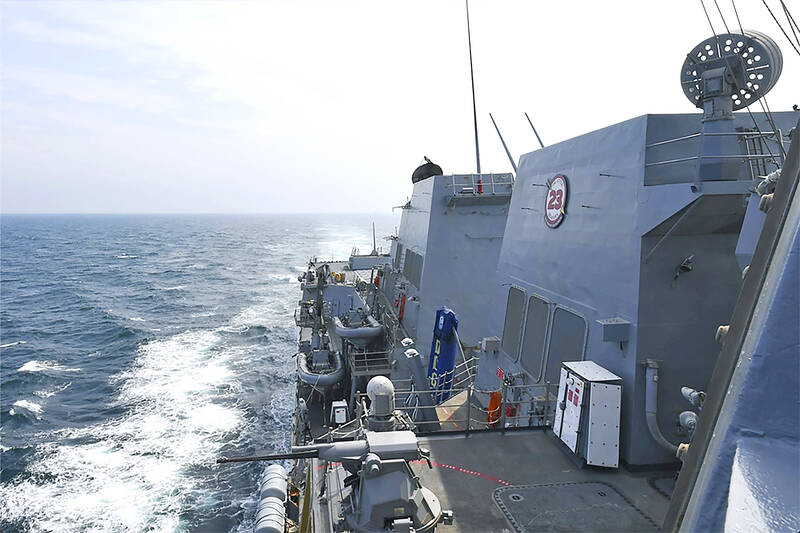Current and former US military leaders are increasingly urging Washington to abandon its long-standing policy of “strategic ambiguity” to counter Beijing’s attempts to change the “status quo” in the Taiwan Strait, Nikkei Asia reported on Friday.
“Strategic ambiguity has had its day and it’s time to move to strategic clarity,” retired admiral Harry Harris, former commander of the US Indo-Pacific Command, told the magazine on the sidelines of the Global Energy Security Talks in Tokyo.
“The Taiwan Relations Act calls for a peaceful resolution and calls for the status quo,” Harris said. “China has changed the status quo and is acting belligerently with regard to Taiwan, so that obligates us to do certain things to help Taiwan.”

Photo: Mass Communication Specialist Third-class Ismael Martinez, US Navy via AP
The act stipulates that peace and stability in the region are in the “political, security and economic interests of the US,” and that the US president and the US Congress must take “appropriate action” should those interests be put at risk, he said.
US President Joe Biden has said four times that his administration would defend Taiwan, Harris said.
“We should take him at his word. He is our commander-in-chief,” he said.
Harris’ successors as commanders of the US Indo-Pacific Command, retired admirals Philip Davidson and John Aquilino, have both testified in Congress that strategic ambiguity had served the US well, Nikkei Asia reported.
However, Commander of the Indo-Pacific Command Admiral Samuel Paparo did not defend the policy of ambiguity or use the term to describe the US’ stance toward Taiwan during his confirmation hearing earlier this year, the magazine said.
“There is no ambiguity for the joint force,” he said. “There is just the mission clarity contained within the Taiwan Relations Act that the [US] Department [of Defense] will aid Taiwan’s ability to defend itself.”
Asked if he meant preparing US regional forces under his command for “every potential,” including combat, Paparo said: “Yes sir. Clarity and mission focus.”
Separately, he told Nikkei Asia during an interview last month that the US closely observed Beijing’s military drills conducted shortly after President William Lai’s (賴清德) inauguration.
“We watched it. We took note. We learned from it. And they helped us prepare for the future,” he said.
He said he was confident the US and its allies would defeat China in a conflict.
However, Jeremy Furchtgott, director of Washington-based consultancy Baron Public Affairs and leader of the firm’s China practice, said that embracing strategic clarity risks forcing China into a corner.
“If the goal is conflict, the US should signal clarity. If the goal is to freeze the current situation, there should be ambiguity and mixed messages,” he told Nikkei Asia.

AIR SUPPORT: The Ministry of National Defense thanked the US for the delivery, adding that it was an indicator of the White House’s commitment to the Taiwan Relations Act Deputy Minister of National Defense Po Horng-huei (柏鴻輝) and Representative to the US Alexander Yui on Friday attended a delivery ceremony for the first of Taiwan’s long-awaited 66 F-16C/D Block 70 jets at a Lockheed Martin Corp factory in Greenville, South Carolina. “We are so proud to be the global home of the F-16 and to support Taiwan’s air defense capabilities,” US Representative William Timmons wrote on X, alongside a photograph of Taiwanese and US officials at the event. The F-16C/D Block 70 jets Taiwan ordered have the same capabilities as aircraft that had been upgraded to F-16Vs. The batch of Lockheed Martin

GRIDLOCK: The National Fire Agency’s Special Search and Rescue team is on standby to travel to the countries to help out with the rescue effort A powerful earthquake rocked Myanmar and neighboring Thailand yesterday, killing at least three people in Bangkok and burying dozens when a high-rise building under construction collapsed. Footage shared on social media from Myanmar’s second-largest city showed widespread destruction, raising fears that many were trapped under the rubble or killed. The magnitude 7.7 earthquake, with an epicenter near Mandalay in Myanmar, struck at midday and was followed by a strong magnitude 6.4 aftershock. The extent of death, injury and destruction — especially in Myanmar, which is embroiled in a civil war and where information is tightly controlled at the best of times —

China's military today said it began joint army, navy and rocket force exercises around Taiwan to "serve as a stern warning and powerful deterrent against Taiwanese independence," calling President William Lai (賴清德) a "parasite." The exercises come after Lai called Beijing a "foreign hostile force" last month. More than 10 Chinese military ships approached close to Taiwan's 24 nautical mile (44.4km) contiguous zone this morning and Taiwan sent its own warships to respond, two senior Taiwanese officials said. Taiwan has not yet detected any live fire by the Chinese military so far, one of the officials said. The drills took place after US Secretary

THUGGISH BEHAVIOR: Encouraging people to report independence supporters is another intimidation tactic that threatens cross-strait peace, the state department said China setting up an online system for reporting “Taiwanese independence” advocates is an “irresponsible and reprehensible” act, a US government spokesperson said on Friday. “China’s call for private individuals to report on alleged ‘persecution or suppression’ by supposed ‘Taiwan independence henchmen and accomplices’ is irresponsible and reprehensible,” an unnamed US Department of State spokesperson told the Central News Agency in an e-mail. The move is part of Beijing’s “intimidation campaign” against Taiwan and its supporters, and is “threatening free speech around the world, destabilizing the Indo-Pacific region, and deliberately eroding the cross-strait status quo,” the spokesperson said. The Chinese Communist Party’s “threats